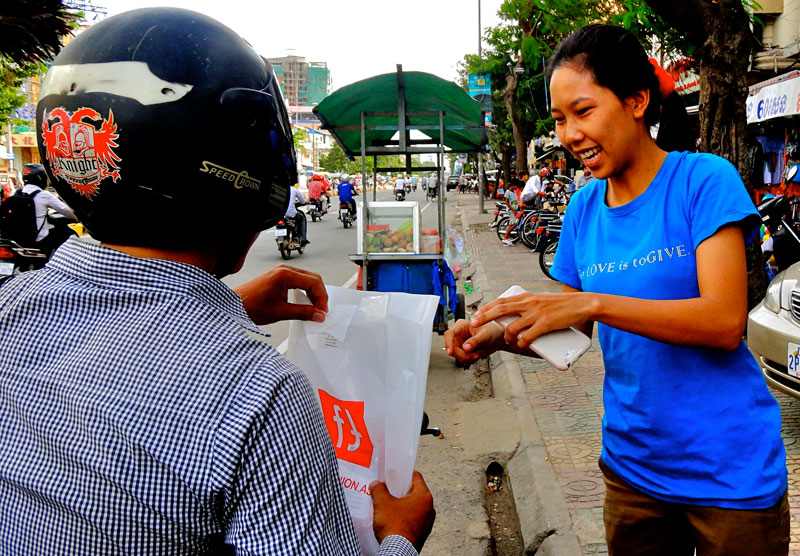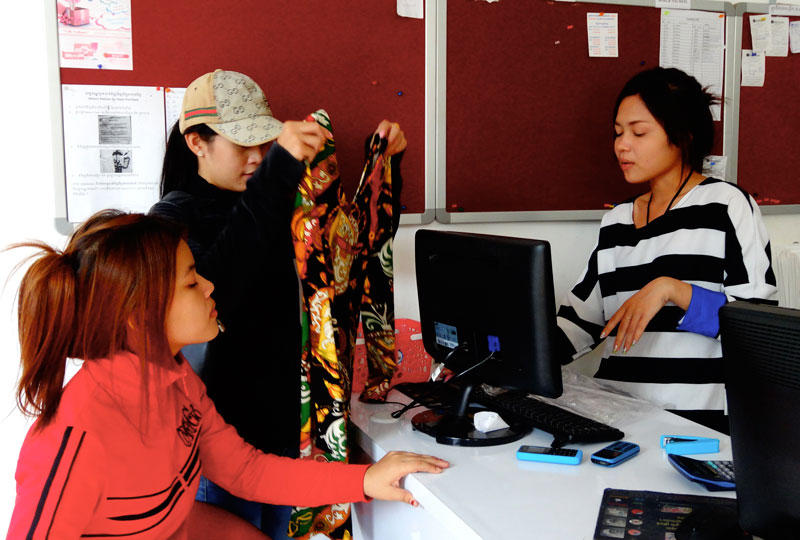It’s a Sunday afternoon in Phnom Penh’s Boeung Keng Kang 1 commune, and Little Fashion is buzzing.
Every weekend, the popular clothing shop fills with customers—not ordinary window shoppers, but loyal Facebook fans—all looking to try on or pick up whatever items caught their eye on social media that week.

Little Fashion helped pioneer the rise of Facebook commerce in Cambodia four years ago. At the time, it was the country’s only online retailer. These days, it corners a rapidly flourishing virtual marketplace that sees dozens of new competitors enter each month.
“Online shopping is quicker and easier,” said owner and co-founder In Vichet, 31, who credits American e-commerce giants Amazon and eBay with inspiring him to set up shop on the Internet.
“And Facebook is a great channel to reach people and establish customer relationships,” he added.
Mr. Vichet said using Facebook as a market platform allows people the convenience of online shopping without the difficulties of online purchasing. Customers comb through the shop’s virtual treasure troves on social media, then place their orders via Facebook or over the phone for cash payment-on-delivery.
Nearly half of Cambodian Facebook users today are aged between 18 and 24. Many of them are full-time students and workers who can’t fit long shopping excursions into their busy schedules.
Ouk Chan Sophea, a 22-year-old student at the National Institute of Business, has been shopping at Little Fashion since its inception. Delivery day found her standing curbside, cash in hand, as she awaited the Little Fashion motorbike bearing her latest online find.
Ms. Sophea said she often comes up empty-handed after a long day at the market. That’s why she prefers shopping online, the only way she can: through social media. As a full-time university student, Ms. Sophea said she simply can’t afford to squander precious free time.
“I don’t have [much] time, so buying clothes online is easier,” she said, grinning as she opened her package and unveiled a pale pink blouse. “And delivery only takes a day!”
Challenges Ahead
Facebook commerce, or “f-commerce,” is the young, social media-savvy entrepreneur’s answer to traditional Internet commerce—or Cambodia’s lack thereof.
Low Internet penetration, minimal credit card use and the absence of a national postal system make buying and selling online a widespread challenge.
But things are looking up, as more and more Cambodians join the digital realm. The number of Cambodian Facebook users increased by nearly 15 percent since the beginning of 2014, and more than doubled since 2012, according to online data trackers. Internet usage, meanwhile, has skyrocketed in recent years, as the cost of mobile phones and data plans have plummeted.
This translates into more people getting comfortable with technology, and more people able to shop online—through whatever channels are available. Right now, that channel is Facebook.
Many newcomers are young, resourceful entrepreneurs themselves, all looking to harness the power of social media for more than just socializing. In doing so, they’re finding creative ways to overcome transactional barriers.
Little Fashion, for example, gives customers the option of ordering by Facebook comment or private message, offers face-to-face customer service in its physical shop and even runs its own delivery-by-moto service—often making up to 50 delivery runs per day, according to Mr. Vichet.
Still, widespread Web illiteracy and a general climate of suspicion toward technology make it difficult to operate a business online, he said.
“Buying online is new, and many people don’t trust it yet” Mr. Vichet said. “You have to build a lot of trust with customers, and that takes time.”

Indeed, trust building may be the greatest challenge for companies emerging on the online commerce scene. Twenty-five-year-old Dara Ratana had to earn the trust of her customers in the real world before creating a Facebook page for her eclectic retail startup, Happy Shop.
“Some [people] don’t trust online shops because they have experienced buying fake products, or low quality products,” she said.
Ms. Ratana started out selling her wares to friends-of-friends, relatives and neighbors. Then, once she established a solid network of real-life customers to vouch for her legitimacy by “liking” her page, she moved business online.
From there, she said, attracting more Facebook fans was a breeze. But she said she wouldn’t have seen much success without first establishing her company’s credibility through personal interactions.
“Now it’s not a problem,” she said. “My customers know I don’t lie to them.”
An Expanding Virtual Marketplace
Little Fashion reigns supreme within the Cambodian cyber sphere. Boasting 436,000 friends, the company enjoys the title of Number One “liked” brand and Number Four most popular overall page on Facebook, according to data released by Social Bakers.
But there are more and more new merchants entering the Facebook market place every month—selling everything from bedding and electronics to ball gowns and skin whitening cream.
One such shop is Chhun Leakena, a ladies’ fashion retailer that just started up in January. Its owner, Thy Leakena, 25, is a former online shopper who discovered she could turn a profit by re-selling clothes on Facebook.
Ms. Leakena said it was really difficult starting out. Like most Facebook merchants, she doesn’t have a physical store where shoppers can verify the quality of her products.
In order to maintain her competitive edge amongst hundreds of other emergent Facebook shops, Ms. Leakana travels to Thailand every month to negotiate the best wholesale prices in person. This allows her to sell clothes online below the market price.
Even well-established retailers are learning they can increase sales by adding a social media dimension to their business model.
This was the case for King of the Man, an upper-class luxury boutique selling designer clothes, handbags and cosmetics. Twenty-two-year-old Cha Ranith and her mother started the company in 2012, but she just created a Facebook page for it five months ago. According Ms. Ranith, business has increased by 60 percent since then.
“If my company had a Facebook page since the beginning, I’d have way more customers by now,” she said.
Even Little Fashion is seeking to expand its virtual presence with a just-launched smartphone application. Mr. Vichet said the new app would bring online shopping to a whole new level, especially since 81 percent of Cambodians access Facebook primarily on their smartphones.
“I think we’ll see many advances [with online shopping] over the next five years,” he said. “But it will take a long time to reach Amazon levels.”



